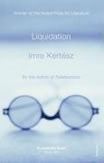2009 books

42) Imre Kertész, Liquidation, 2003
Communism has fallen in 1990s Hungary, the publishing house of the literary editor Kingbitter is about to fold, and his friend, B., the only author he admired, has just comitted suicide. B. was an extraordinarily perceptive writer, having written a play, Liquidation, which predicted precisely how his coterie of friends and lovers would react after his death: Kingbitter reads about himself doing exactly what he has recently done. This clever beginning to the novel hints at layers of metaphysical introspection, a clever interweaving of meanings and motives, but this 'Matryoshka doll' technique of hiding stories within stories only goes so deep here. Further in, and always central to Kertész's concerns, is the nature of evil and its coexistence with good, the impossibility of truly escaping the mental confines of Auschwitz even after that too has come and gone, and the question of how does one continue to live on after or whether there's greater dignity in ending it all before the survival instinct disappears forever. A book that's full of things coming to an end with no new beginnings, short novels don't come much weightier than this.